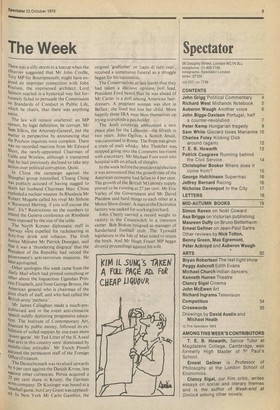The Week
There was a silly storm in a teacup when the Observer suggested that Mr John Cordle, Tory MP for Bournemouth, might have enJoYed an improper connection with John Poulson, the imprisoned architect. Lord Salmon reacted in a hysterical way but fortunately failed to persuade the Commission O n Standards of Conduct in Public Life, Which he chairs, that there was anything amiss.
The law will remain unaltered: an MP cannot, by legal definition, be corrupt. Mr Sam Silkin, the Attorney-General, put the matter in perspective by announcing that the Poulson inquiries were complete. There Was no recorded reaction from Mr Edward Short, the newly-appointed Chairman of Cable and Wireless, although it transpired that he had previously declined to take any action over political corruption. Quite.
In China the campaign against the Shanghai group intensified. Chiang Ching Was publicly accused of having nagged to death her husband Chairman Mao. China exploded a nuclear weapon. In Rhodesia Mr Robert Mugabe called his rival Mr Sithole a 'Reverend Herring, if you will excuse the 'pun'. Eh? Restrictions on the numbers to attend the Geneva conference on Rhodesia Were imposed by the size of the table.
The North Korean diplomatic staff in Norway were expelled for racketeering in duty-free drink and tobacco. The Irish Justice Minister Mr Patrick Donegan, said that it was a 'thundering disgrace' that the President of the Republic had vetoed the government's anti-terrorism measures. He later apologised.
Other apologies this week came from the bai/Y Mail which had printed something or Other about the loquacious Ugandan Princess Elizabeth, and from George Brown, the American general who is chairman of the Joint chiefs of staff, and who had called the British army 'pathetic'.
Mr James Callaghan made a much-prePublicised and in the event anti-climactic Speech mildly deploring progressive education. The Institute of Contemporary Art, financed by public money, followed its exhibition of soiled nappies by one even more avant-garde'. Mr Ted Litter of the ICA said that arts in this country were 'dominated by Ruddle-class attitudes'. Mr Enoch Powell accused the permanent staff of the Foreign Office of treason.
The Deutschemark was revalued upwards bY 6 Per cent against the Danish Krone, less against other currencies. Persia acquired a 25 Per cent share in Krupp, the German arms company. Dr Kissinger was booed at a baseball game, but Cary Grant was applauded. In New York Mr Carlo Gambini, the
original 'godfather' or 'capo di tutti capi', received a sumptuous funeral as a struggle began for his succession.
The Conservatives at last learnt that they had taken a decisive opinion poll lead. President Ford heard that he was ahead of Mr Carter in a poll among American hairdressers. A pregnant woman was shot in Belfast: she lived but lost her child. More happily three IRA men blew themselves up trying to explode a gas-holder.
The Arab countries announced a new peace plan for the Lebanon—the fiftieth in two years. John Ogilvie, a Scotch Jesuit, was canonised in Rome. The Pope was given • a crate of malt whisky. Mrs Thatcher was_ stopped going into the Commons tea-room with a secretary. Mr Michael Foot went into hospital with an attack of shingles.
In the week before the presidential election it was announced that the growth rate of the American economy had fallen to 4 per cent. The growth of the British M3 money supply proved to be running at 27 per cent. Mr Eric Varley of the Government and Mr David Plaistow said hard things to each other at a Motor Show dinner. A man at the Electrolux factory was sacked for working too hard.
John Cherry carried a record weight to victory in the Cesarewitch in a common canter. Bob Stokoe resigned as manager of Sunderland football club. The Tynwald legislature in the Isle of Man voted to retain the birch. And Mr Hugh Fraser MP began divorce proceedings against his wife.










































 Previous page
Previous page